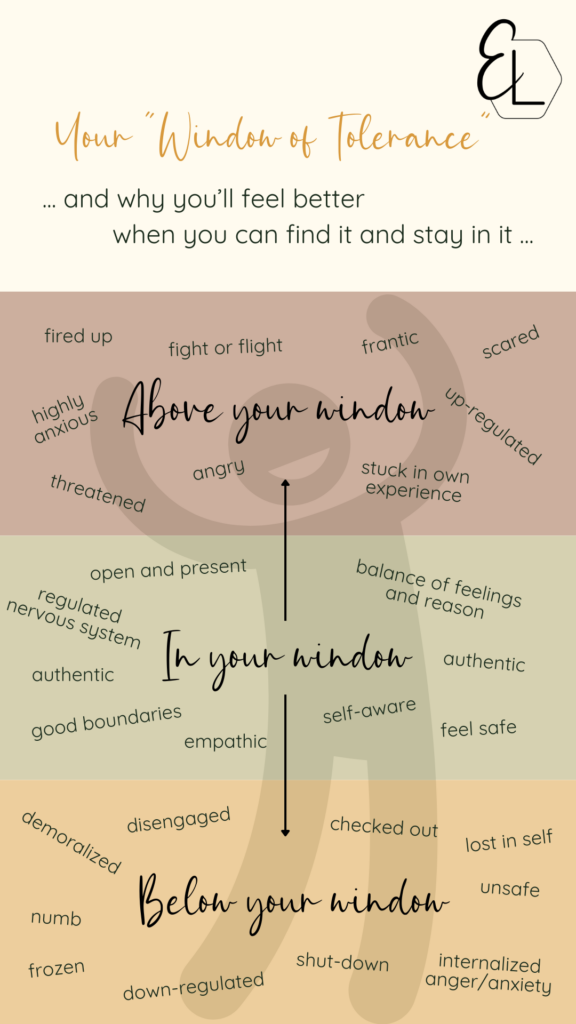In a world where we’re constantly juggling tasks, responsibilities, and the pressure to perform, it’s easy to forget one of the most important aspects of life: self-love. Many people associate self-love with moments of pampering, like a bubble bath or buying yourself a treat, but it goes much deeper than that. True self-love is about nurturing yourself in ways that promote mental, emotional, and physical well-being. One crucial but often overlooked aspect of self-love is self-regulation—the ability to manage and respond to your emotional and physical state in a healthy way.
This blog explores how self-love and self-regulation are intertwined, how learning to regulate your emotions and behaviors can improve your mental health, and how recognizing your “window of tolerance” and becoming aware of signs that you may be disconnected from your body can guide you toward living a balanced and fulfilling life.
Self-Love is Self-Regulation
Self-regulation is a core component of emotional intelligence and refers to the ability to manage one’s emotions, behaviors, and thoughts in a way that fosters personal well-being and healthy relationships. In essence, it is the practice of choosing how to respond to life’s challenges rather than being driven by automatic reactions. And this is where self-love comes in: true self-love isn’t just about indulging your desires, but rather about taking the time and effort to care for your nervous system and emotional health.
When we practice self-regulation, we are actively engaging in self-love. Rather than allowing our nervous system to spiral into stress, anxiety, or overwhelm, we take conscious steps to calm our emotions and return to a place of balance. This could be through techniques such as deep breathing, mindfulness, or even physical practices like yoga or exercise. By regulating ourselves, we honor our body’s needs and our emotional boundaries, creating space for healthier, more loving interactions with ourselves and others.
Learning How to Regulate:
Learning how to regulate your emotions is an ongoing process, one that requires patience and practice. It’s about recognizing your triggers, understanding the physiological response they cause, and using techniques to help you return to a state of calm. Self-regulation also involves developing the ability to be aware of your emotional state without judgment.
There are many strategies you can use to enhance your emotional regulation:
1. Mindfulness and Meditation: These practices help increase awareness of your thoughts and feelings, allowing you to respond to them rather than react impulsively. Regular mindfulness practice can help you notice when your body is starting to experience stress or overwhelm, giving you the chance to pause and choose how to respond.
2. Breathing Techniques: Deep, slow breathing is a simple yet powerful way to regulate your nervous system. Practices like the 4-7-8 technique or box breathing can activate the parasympathetic nervous system, the “rest and digest” part of the autonomic nervous system, helping to counterbalance the fight-or-flight response that often occurs during times of stress.
3. Physical Movement: Exercise is an excellent way to regulate the nervous system and relieve built-up tension. Whether it’s a walk in nature, a dance session, or more structured activities like yoga, moving your body can release pent-up stress and trigger the production of endorphins, promoting feelings of happiness and relaxation.
4. Cognitive Reframing: This is the process of changing negative or unhelpful thoughts into more positive, realistic ones. By shifting your thinking patterns, you can reduce feelings of stress or anxiety and move toward a more regulated emotional state.
5. Grounding Techniques: These techniques help you reconnect with your body when you’re feeling overwhelmed. Simple actions like focusing on the sensation of your feet on the ground or holding onto an object can bring you back into the present moment and calm your nervous system.
Signs of a Healthy Window of Tolerance

One important concept to understand in the context of emotional regulation is the “window of tolerance.” The window of tolerance refers to the optimal zone of arousal in which you can function effectively and manage stress without becoming overwhelmed. Inside this window, you feel calm, focused, and capable of processing your emotions. Outside of this window, either into hyperarousal (intense anxiety or panic) or hypo arousal (numbing, dissociation, or depression), it becomes difficult to think clearly or make sound decisions.
Signs of a healthy window of tolerance include:
1. Calmness and Clarity: You feel present and aware of your thoughts and feelings, without being overtaken by them.
2. Emotional Resilience: You can experience difficult emotions, such as sadness or frustration, without becoming completely overwhelmed or shutting down.
3. Connection with Others: In a regulated state, you can engage with others in a compassionate, empathetic way, creating meaningful and healthy connections.
4. Effective Problem-Solving: You’re able to face challenges with a clear mind, using logical thinking and creativity to find solutions.
5. Balanced Physical State: Your body feels grounded and stable, and you experience energy and vitality without feeling overly fatigued or tense.
Signs You Are Disconnected from Your Body
Being disconnected from your body can manifest in various ways, and it often occurs when you’ve spent a prolonged period in a state of stress or overwhelm. Disconnection from the body can be a defense mechanism, as the body may subconsciously attempt to protect you from emotional pain or trauma. However, this disconnection can also prevent you from recognizing when you need rest, nourishment, or emotional care.
Some signs you may be disconnected from your body include:
1. Numbness or Detachment: You might feel emotionally numb, disconnected, or detached from your feelings and physical sensations. This can be a result of suppressing emotions or experiencing emotional overwhelm.
2. Chronic Stress or Fatigue: If your body is constantly in a state of fight-or-flight, you may not feel the natural urge to rest or recharge. This can lead to persistent exhaustion or burnout.
3. Difficulty Recognizing Hunger or Fullness: You may lose touch with your body’s signals of hunger or satiety, leading to overeating or undereating, or simply ignoring the need to nourish yourself properly.
4. Tension and Pain: Physical sensations like chronic muscle tension, headaches, or stomach discomfort can be signs that you’re not attuned to your body’s needs.
5. Over or Underreaction to Stress: Either feeling overwhelmed by minor stressors or shutting down completely when faced with challenges can indicate that you’re not in touch with your body’s natural response to stress.
February: The Month of Love and the Importance of Self-Love for a Healthy Nervous System
February is often associated with love—romantic love, love for friends and family, and acts of kindness. However, one of the most important and often overlooked forms of love is self-love. True self-love is not just about treating yourself to a fancy dinner or indulging in a spa day (though those things are lovely). It’s about caring for your mental, emotional, and physical well-being by learning to regulate your nervous system.
A healthy nervous system is at the heart of good mental and emotional health. When we engage in self-regulation, we’re essentially telling our nervous system that we are safe and cared for. By practicing mindfulness, movement, healthy communication, and emotional awareness, we cultivate a calm and stable foundation within ourselves.
This month, as you celebrate love in all its forms, take the time to give yourself the gift of self-regulation. Honor your body, listen to your nervous system, and practice the self-care techniques that help you feel grounded, balanced, and connected. In doing so, you are practicing the highest form of love—love for yourself, and the well-being of your nervous system, which affects every aspect of your life.
Remember, self-love is self-regulation. You are worthy of this love, and by caring for your body and emotions, you create the foundation for a life filled with peace, health, and deeper connection with others. Happy February, and may this month be filled with love, both for yourself and those around you.

Leave a Reply